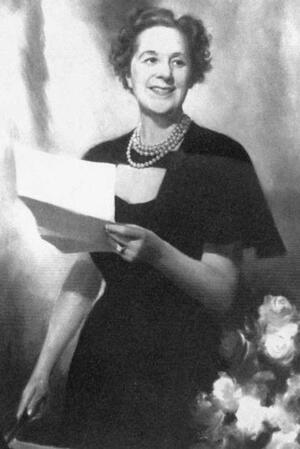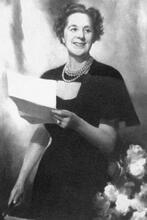Caroline Klein Simon
Caroline Klein Simon fought for gender and racial equality and made the first laws against the use of “blockbusting” tactics to force sales of homes. Finding that no one would hire a married Jewish woman lawyer, Simon volunteered for the League of Women Voters and the National Council of Jewish Women, among other organizations. In 1935, she became executive director of the New York State Council of Jewish Women and in 1939 she became editor of the Birth Control Review. In 1945, she became the only woman on the State Commission Against Discrimination; in 1956, she was named to the State Youth Commission. In 1959, she became Secretary of State of New York, where she continued her efforts to prevent racial and gender discrimination. In 1963, she was appointed a judge of the New York Court of Claims.
Family and Volunteer Work
Attorney Caroline Klein Simon’s long career included state office and judicial posts and lifelong efforts in partisan and non-partisan politics and Jewish philanthropy. Born on November 12, 1900, in New York City, she grew up in Mount Vernon and attended Columbia University. She graduated from New York University Law School in 1925. Married, Jewish, and female, she at first could not find a firm that would hire her as an attorney. Advised by friends that volunteer work might lead to remunerative work, she became an unpaid law clerk in the firm of Greenbaum, Wolff, and Ernst. She became active in city women’s organizations, especially in the Women’s City Club and the League of Women Voters.
Simon focused her organizational work on legislative affairs and issues of crime prevention and correction. Spearheading a campaign to place women on juries in New York, with the help of newly elected women in the New York state legislature she finally won nonmandatory service in 1937. Among her other public causes was reforming the Women’s Court, which she called “a tragic place,” “a circus at which the participants were human misery in its final form, and the onlookers were those who were so depraved as to find this to their taste.” She worked to make the court a place that no one could enter without legitimate purpose. She also worked closely with Jewish groups, including the National Council of Jewish Women and the Women’s Division of the Federation of Jewish Philanthropies.
Administrative Career and Politics
Eventually Simon found paid work, first in public relations and later in administration. In 1935, she became executive director of the New York State Council of Jewish Women. Between 1939 and 1940, she edited the Birth Control Review. She also took up partisan politics, in the 1930s supporting Franklin D. Roosevelt, even though she was a registered Republican. She directed the Women’s Division of a Non-Partisan Committee for the Election of Thomas E. Dewey (first as district attorney in 1937, then as governor in 1944) and in 1942 chaired the Women’s Division of the United City Party for Fiorello LaGuardia.
During World War II, she received her first state government posts. In August 1943, she became a member of the State War Council’s Committee on Discrimination in Employment; as a member of the Workmen’s Compensation Board from 1944 to 1945, she heard workers’ appeals. After 1945, she was the only woman member of the State Commission Against Discrimination, a post she held for more than ten years and in which she helped draft the state law against racial discrimination. Governor Dewey made her a member of the State Industrial Board in January 1945. Considering her an expert on crime prevention and the problems of children’s and women’s courts, Governor Averell Harriman named Simon a member of the State Youth Commission in 1956.
In 1957, Simon made a brief foray into electoral politics. The first woman to be nominated for citywide office, she ran for president of the New York City Council, losing but polling 100,000 more votes than the Republican candidate for mayor. Governor Nelson Rockefeller then named her secretary of state of New York, a post she held from 1959 to 1963, after which she occupied a seat on the New York Court of Claims until 1971. In the late 1960s, Simon was a leader of the National Council on Crime and Delinquency.
Simon spoke and wrote widely on legal and public issues, especially on racial and sexual discrimination. Like many women of her generation, she would precede remarks about discrimination against women with the phrase “I am not a feminist,” but would also quip that to succeed in modern times “a woman … must look like a girl, act like a lady, think like a man, and work like a dog.”
She divorced her first husband, Leopold King Simon, with whom she had two children; her second husband, Irving W. Halpern, chief probation officer of the New York State Supreme Court, died in 1966. Active in legal work into her nineties, Catherine Klein Simon died on June 29, 1993.
Simon, Caroline Klein. Papers. Schlesinger Library, Radcliffe College, Cambridge, Mass..
WWIAJ.




